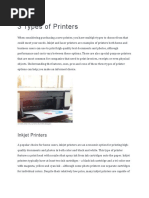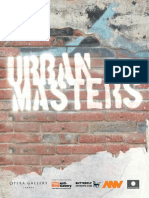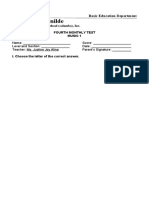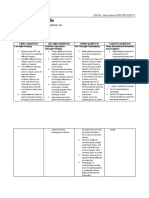0 ratings0% found this document useful (0 votes)
133 viewsUnit 18 Print Based Media
Uploaded by
api-247822766Copyright
© © All Rights Reserved
Available Formats
Download as DOCX, PDF, TXT or read online on Scribd
0 ratings0% found this document useful (0 votes)
133 viewsUnit 18 Print Based Media
Uploaded by
api-247822766Copyright
© © All Rights Reserved
Available Formats
Download as DOCX, PDF, TXT or read online on Scribd
You are on page 1/ 11
Unit 18: Print Based Media
Digital Printing Techniques
Photocopying
What is it?
The term photocopying is used to refer to the act of making a photographic copy of a
document. It is mostly done by use of a photocopy machine. A photocopy machine is an
electronic duplicator that fuses a reproduced image to plain bond paper.
Advantages
A photocopier machine can make a lot of copies at once.
A photocopier machine is usually cheaper to use compared to using a printer.
The machine copies your document fast, so you don't have to wait that long.
The photocopier machine copies your document accurately.
Disadvantages
Its a big machine so it will take up a lot of space.
The machine is really heavy so it will be hard to move around.
The machine is very expensive to buy.
Where is it used?
You will find a photocopier in offices, colleges, schools etc.
It is normally used to make copies of drawings, text or photographs.
Who has used it?
James Watt invented this document copier to relieve him of the tedium of making copies of
his plans and drawings. The press copies a written document by pressure onto thin,
translucent, unsized paper, producing a reversed copy from the back. Watt patented the
device in 1780 and his company continued to produce it long after his death. The principle
on which the machine is based remained in use until the arrival of modern photocopiers.
What skills and knowledge are needed?
Operation Monitoring - Watching gauges, dials, or other indicators to make sure a
machine is working properly.
Monitoring - Monitoring/Assessing performance of you, other individuals, or
organizations to make improvements or take corrective action.
Cost
Double Sided
Print type Cost / page Equivalent cost /side
A4 Black and White 4p 2p
A4 Colour 14p 7p
A3 Black and white 8p 4p
A3 Colour 30p 15p
Single Sided
Print type Cost / page Equivalent cost /side
A4 Black and White 3p 3p
A4 Colour 10p 10p
A3 Black and white 6p 6p
A3 Colour 15p 15p
Equipment
You will need a photocopier
How many can you make? Is it a one off or is it easy to make 100?
You can pretty much make as many as you like considering you have enough ink and paper
but also have enough printing credit if using it in a public place like a library or classroom.
Step By Step Guide
1. Turn on the photocopier by pressing the power switch located on the
front of the machine.
2. Allow the photocopier to warm up before use; older photocopiers take
longer to power up than the newer models.
3. Lift up the top cover to find the glass platen, and then place your
document face down onto the glass. When you look there are guide
marks for different sizes of paper so make sure you place it in the right
bit.
4. Lower the cover and make sure its shut properly.
5. Select the number of copies you would like from the control panel on
the photocopier.
6. Choose whether you want it in black and white or in colour.
7. Press the copy button and it should start to copy the document and
your copies should now be printing from the tray.
Laser Printing
What is it?
Laser printing is a digital printing process that quickly produces high quality text and
graphics by passing a laser beam over a drum. The drum is then rolled through the
toner which is picked up by the charged portions of the drum. Finally the toner is
transferred through a combination of heat and pressure. This is naturally how a copy
machine works.
Because laser printers do not use ink, they have less image smearing problems
than inkjet printers and are able to print pages faster. While laser printers and toner
cartridges typically cost more than inkjet printers and ink cartridges, most laser toner
cartridges last several times longer than ink cartridges, which make their cost per
page about equal.
Advantages
The main advantage behind these printers is probably its efficiency and speed at
printing. Laser printers are also known as 'page printers' as they print documents
a page at a time, and performs it at a very fast rate.
They produce highest quality output in comparison with the other types of
printers. This is mainly due to the technology behind it as laser printers utilize
electro-photography for printing which results in quality output.
While it is a small issue, noise can be very unproductive and disturbing especially
at a work place; laser printers are highly optimized and barely emit any sound.
They also offer user-friendliness with other features like self-printing, where
printing maybe done without supervision thus increasing productivity at the
workplace.
Disadvantages
With the extra benefits in comparison with other printers, they are a lot more
costly.
Laser printers are powerful and utilize complex technology and perform fast
output, the result of which is a relatively large hardware device which can take up
a lot of space.
As they are non-impact printers, multipart stationary cannot be used thus
duplicate printing cannot be simultaneously performed.
While the cost is an issue, an initial investment only maybe worth it based on
your organization's or personal requirements, however maintenance, servicing
and repair of this hardware device is also very high thus laser printers aren't very
economical.
Laser printers are also known to be hazardous to the atmosphere and your
health. Due to the high voltages when running the machine, small amounts of
ozone are generated this can damage the ozone layer. Some laser printers are
also known to emit particles that are suspected to cause respiratory diseases.
Where is it used?
At one time, laser printers were almost exclusively used by businesses because
the price put them out of reach of most consumers. Today, laser printer
companies make low cost laser printers intended for home use. These printers
are not quite as rugged as their industrial counterparts, but they do have all of the
properties that make laser printers a desirable choice.
Who has used it?
People of all ages can use it because it doesnt require certain skills for you to get
it to work.
Cost
It can be used for home use so its not that expensive.
Equipment
Help increase productivity with print speeds up to 20ppm
Is it easy to make 100?
Its easy to make 100, because you just have to press a button and make sure
there is enough paper.
Step By Step Guide
1. Turn on the printer.
2. Select how many you would like to print.
3. When the printing is done collect your document.
Screen Printing
Screen printing is a method where stencils are used to apply paint onto t
shirts, posters, wood or cards. I can work on a wide range of fabrics and
material. Screen printing is a technique that uses a machine to spread in
over the stencil so you get a solid image. While printing a blade or
squeegee is moved across the screen forcing ink through the template to
form the design.
Advantages
Very easy to use
You can use the same template over and over again to produce the same design.
Disadvantages
The ink can leak and make a lot of mess.
Artists who have used it?
Dogboy
Dan Mather
Cost
The cost of screen printing can be very expensive, it would cost over 1000 to get all
the equipment and paint.
Speed
The processing speed is fairly fast because you can constantly use the same
template.
Step By Step Guide
1. You will need to produce a screen, either drawing it yourself or cutting out a
design.
2. Cover the design with mesh.
3. Coat the screen with emulsion
4. Expose your image
5. Place the material or fabric underneath the push the paint through using one
solid motion.
Letter Press
Letter press is a technique of printing using a printer press. You lock a movable type
into the bed of the press, and then ink it, when doing this it presses the paper against
it and transfer the ink onto the paper.
Its a modern way of printing but the process itself can be really slow, but also messy
if you dont know what you are doing. Each colour will have to dry if you want to use
another one, the main things it can be used for is t shirt labels or tags and back in
the olden days was used to write letters.
One thing that makes this printing technique really tricky is that if you make a
mistake you have to redo the whole design which can be a long and frustrating
process.
The skills needed are a steady hand and knowledge on how the machine works.
The machine itself is quite expensive.
Step By Step Guide
1. Produce a design
2. Apply the ink
3. Press the ink onto your design.
Stencil Printing
Stencils are used by many people nowadays because it is guaranteed to project your
image onto most surfaces with its shape intact. A stencil is where you draw or print
a design on a piece of card and then using a scalpel or a sharp knife cut out the
outline of the design.
Advantages
Its very easy to do.
Disadvantages
Very messy
A well-known street artist named Banksy uses Stencils these are some examples of
his art.
There arent many skills you need just being able to draw and cut out using a scalpel
is all you need really. The cost of using this printing method is cheap as all you really
need is spray paint or paint, a cutting tool and card to produce the template.
Depending on the quality of the card you may be able to use it multiple times if the
card is strong enough.
Step By Step Guide
1. Draw a design
2. Cut out the design to form a template
3. Stick your template on another piece of card or a surface you want to print on.
4. Spray from a distance
5. Allow the design to air dry.
You might also like
- 2,286 Traditional Stencil Designs (PDFDrive)100% (6)2,286 Traditional Stencil Designs (PDFDrive)482 pages
- Introduction To Wall Printer Aditya 26.12.2023No ratings yetIntroduction To Wall Printer Aditya 26.12.202320 pages
- How Does Offset Printing Work? an in-Depth Guide - MeyersNo ratings yetHow Does Offset Printing Work? an in-Depth Guide - Meyers17 pages
- SPGPrints - The Ultimate Guide To Digital Textile Printing100% (1)SPGPrints - The Ultimate Guide To Digital Textile Printing16 pages
- Textile Chemical Processing: Comparative Study On Screen, Digital and PrintingNo ratings yetTextile Chemical Processing: Comparative Study On Screen, Digital and Printing17 pages
- Introduction To Computer Technology With Keyboarding: BSHM Ib KB INo ratings yetIntroduction To Computer Technology With Keyboarding: BSHM Ib KB I9 pages
- Printers Printer Connections and PrintingNo ratings yetPrinters Printer Connections and Printing21 pages
- Operating A Personal Computer Learning Outcome 5: Install Printer and Ensure Correct Printer Setting Assessment CriteriaNo ratings yetOperating A Personal Computer Learning Outcome 5: Install Printer and Ensure Correct Printer Setting Assessment Criteria11 pages
- What Makes Reosura Alternative Screen Printing Machine DifferentNo ratings yetWhat Makes Reosura Alternative Screen Printing Machine Different3 pages
- Associate - Printer Basics1 - EN - v2 - WorkbookNo ratings yetAssociate - Printer Basics1 - EN - v2 - Workbook63 pages
- Lec-2.8 Printers - Dot Matrix, Inkjet and Laser PrinterNo ratings yetLec-2.8 Printers - Dot Matrix, Inkjet and Laser Printer25 pages
- A Guide To The Offset Printing Process: PrintNo ratings yetA Guide To The Offset Printing Process: Print12 pages
- Chapter Six 6. Fundamentals of Printers and Scanners 6.1No ratings yetChapter Six 6. Fundamentals of Printers and Scanners 6.122 pages
- Final Major Project - : Originating MY DeasNo ratings yetFinal Major Project - : Originating MY Deas15 pages
- Free Online Monogram Maker Custom Font Generator PDFNo ratings yetFree Online Monogram Maker Custom Font Generator PDF1 page
- Pop Up The Art of Dimensional Moving Paper Designs 3100% (1)Pop Up The Art of Dimensional Moving Paper Designs 320 pages
- 1999 Frederick at The Center of It All PDFNo ratings yet1999 Frederick at The Center of It All PDF13 pages
- Printable Letters & Alphabet Letters - World of PrintablesNo ratings yetPrintable Letters & Alphabet Letters - World of Printables1 page
- TB43-0209 Color, Markings and Camouflage 1990100% (2)TB43-0209 Color, Markings and Camouflage 1990407 pages
- Saint Benilde: International School (Calamba), Inc. Fourth Monthly Test Music 1No ratings yetSaint Benilde: International School (Calamba), Inc. Fourth Monthly Test Music 125 pages
- A-A-208c Commercial Item Description Ink, Marking, Stencil, OpaqueNo ratings yetA-A-208c Commercial Item Description Ink, Marking, Stencil, Opaque6 pages
- Introduction To Screen Printing: Creating Your StencilNo ratings yetIntroduction To Screen Printing: Creating Your Stencil4 pages
- 3D Printing 101: The Ultimate Beginners GuideFrom Everand3D Printing 101: The Ultimate Beginners Guide
- How Does Offset Printing Work? an in-Depth Guide - MeyersHow Does Offset Printing Work? an in-Depth Guide - Meyers
- SPGPrints - The Ultimate Guide To Digital Textile PrintingSPGPrints - The Ultimate Guide To Digital Textile Printing
- Inkjet Printing on Fabric: Direct TechniquesFrom EverandInkjet Printing on Fabric: Direct Techniques
- Textile Chemical Processing: Comparative Study On Screen, Digital and PrintingTextile Chemical Processing: Comparative Study On Screen, Digital and Printing
- Introduction To Computer Technology With Keyboarding: BSHM Ib KB IIntroduction To Computer Technology With Keyboarding: BSHM Ib KB I
- Operating A Personal Computer Learning Outcome 5: Install Printer and Ensure Correct Printer Setting Assessment CriteriaOperating A Personal Computer Learning Outcome 5: Install Printer and Ensure Correct Printer Setting Assessment Criteria
- What Makes Reosura Alternative Screen Printing Machine DifferentWhat Makes Reosura Alternative Screen Printing Machine Different
- Lec-2.8 Printers - Dot Matrix, Inkjet and Laser PrinterLec-2.8 Printers - Dot Matrix, Inkjet and Laser Printer
- Chapter Six 6. Fundamentals of Printers and Scanners 6.1Chapter Six 6. Fundamentals of Printers and Scanners 6.1
- Free Online Monogram Maker Custom Font Generator PDFFree Online Monogram Maker Custom Font Generator PDF
- Pop Up The Art of Dimensional Moving Paper Designs 3Pop Up The Art of Dimensional Moving Paper Designs 3
- Printable Letters & Alphabet Letters - World of PrintablesPrintable Letters & Alphabet Letters - World of Printables
- Saint Benilde: International School (Calamba), Inc. Fourth Monthly Test Music 1Saint Benilde: International School (Calamba), Inc. Fourth Monthly Test Music 1
- A-A-208c Commercial Item Description Ink, Marking, Stencil, OpaqueA-A-208c Commercial Item Description Ink, Marking, Stencil, Opaque
- Introduction To Screen Printing: Creating Your StencilIntroduction To Screen Printing: Creating Your Stencil









































































































